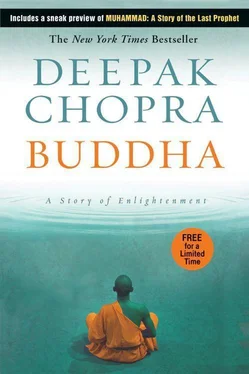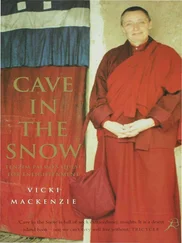“Stop it!” One of the old men stepped forward, raising his hands and shushing the others. His starved body was wrapped in dirty hemp cloth, but underneath Siddhartha glimpsed saffron rags, the color of Canki’s robes.
“The gods, not this noble youth, have brought such misfortune on us. We should give him money to take back and make offerings for us.” Scorn greeted the old priest’s suggestion; he wriggled his way through the crowd. “Blessings, blessings,” he muttered as he edged closer to Siddhartha.
The old priest smelled almost as bad as the corpses. He smiled toothlessly, and Siddhartha was ashamed of himself for drawing back. “Bend close, young prince, and let me whisper a special blessing in your ear.”
Siddhartha forced himself to lean over, closing his eyes against the old man’s fetid breath. “I accept your blessing,” he said politely.
“And I curse you to hell unless you take me back with you.” The vehemence in the old priest’s voice was like cobra venom. Siddhartha jerked back. Without a word he jumped into the saddle. He felt the priest’s tight, bony grip on his ankle, but he kicked free and galloped off. Behind him the population of the forgotten city jeered and catcalled. Others cried out piteously, and when he could no longer hear any of them, Siddhartha stopped. Kanthaka’s sides were heaving; so were Siddhartha’s. He leaned over and whispered, “Forgive me,” into Kanthaka’s ear, even though he hadn’t driven him that hard.
Channa caught up where the road was starting to slope back upward and become a mountain trail again. Siddhartha waited for him. “How often have you come here?” he asked.
“Once or twice. But you’re not coming back. What’s here for you? Your father won’t let you save them, and by the time you’re king they’ll all be dead. Face facts. One strong wind this winter is all it would take.”
Siddhartha hated these words but didn’t argue. The sun was still mercilessly hot, and they had given their goatskins of water to the old ones.
Channa’s right. It should be called the king’s city. His conscience searched for what to do. Should he go back and farm the fields himself with a few slaves from the palace, against his father’s wishes? Would it do the slightest good to send them to the forgotten city? Underneath all this was Sujata, who haunted him now more than at the moment he had learned she was gone. For a fleeting instant he could see her on a table in the house of the dead.
It was at that painful moment that Siddhartha caught a glimpse of someone. A naked hermit was hidden in the thick underbrush, crouching on his heels. His sun-brown skin made him nearly invisible against the ground except for his beard, which was nearly white. If Siddhartha hadn’t happened to turn for a last glimpse behind, he would have missed him.
“Asita!” Siddhartha called out, jumping down from his horse. The sudden motion must have frightened the hermit, who scurried away into the thicket out of sight. “Wait, don’t you know me?” Siddhartha was baffled but plunged into the underbrush, heedless of thorns and snakes. The hermit was escaping as noiselessly as a deer. Siddhartha stopped, straining his ears to catch any telltale sound. Channa came up behind him. “What’s wrong?”
“You didn’t see him? It was Asita.”
“If it was, he’s a million years old. I thought I saw an old man, that’s all. Probably following us from the village,” said Channa.
But they both knew an old man couldn’t keep up with horses. Siddhartha was too excited to stop and convince Channa. “Asita!” he called.
Siddhartha set a direction upslope and followed it, telling Channa to wait below. There was no trail to follow anymore, and after a moment he was immersed in deepest jungle. Scarlet parrots scolded him from overhead; a lone monkey scouring the ground for fallen fruit was startled and leaped up a tree with a scream. Siddhartha pressed on with more energy, even though he knew he was running aimlessly, fueled by what he wanted to find rather than what he would. Then, just when it was undeniable that the jungle had swallowed up all traces of the hermit, he stumbled on something.
Hidden in the dense growth was a small clearing, so shaded by trees that it felt like a green cave. Panting, Siddhartha stopped and looked around. Someone definitely lived here. From a fire circle, wisps of smoke arose. A bamboo lean-to nestled in one corner with moss spread for a bed. His eye was caught by a pile of rocks made into a shrine. On top was the only sign that anyone but a primitive called the place home: a small picture of Shiva painted in jewel tones, like the forlorn one he’d seen at the house of the dead.
But this god was well tended, with fresh pink wood orchids at the base. Shiva was sitting in lotus position, a tiger skin wrapped around his shoulders. His eyes were closed; a mysterious smile played across his face. Gazing at him, Siddhartha felt exhausted. He had no idea where he was and no longing for anywhere else. Perhaps the faint memory of a rose-apple tree when he was a boy came to mind. He felt his legs give way, and he sat on the ground facing Shiva. He folded his legs in the same position as the god’s and closed his eyes.
The green cave was cool and soothing. Siddhartha felt that he belonged here, but there was little time for thinking. A kind of seductive silence wanted to pull him in. It softly surrounded him, and he gave in to the embrace. He could feel his breath moving in and out of his chest, growing fainter and fainter. A fly landed on his arm, and it was as if he could feel every step of its feet before it flew away again.
Nothing changed for a time-how long, he couldn’t judge-and then Siddhartha’s eyes opened. Before him squatted the old hermit on his heels. It wasn’t Asita, but the two were made from the same mold. The hermit had deep brown eyes whose calm belied his weathered skin. Neither of them moved. Then the hermit raised a finger to his lips, and Siddhartha nodded imperceptibly, letting his eyelids close again, sinking back down into the silence. Now he clearly saw the image of a boy sitting under a rose-apple tree while the anxious world swirled around him. How had he forgotten Asita’s advice back then, that there would always be a place for him to go when he was in trouble?
With a deep sigh of relief, Siddhartha knew he was back. He hadn’t remembered the silence, but it had remembered him. And waited. It would be so easy to sit forever. A gentle current flowed through his body, and when a thought chanced to arise, it escaped like a dandelion puff blown away in the breeze.
Before time and space disappeared like thieves in the night, he had a fleeting perception. Something he couldn’t identify-a cloud of golden flecks? a ghost wearing a smile? a god?-was hovering a few inches over his head, just where the current had escaped. The cloud or god shimmered for a second. Siddhartha had the distinct feeling that it was watching him.
Then without any warning it began to descend.
PART TWO.GAUTAMA THE MONK
11
The skies had given plenty of warning all day. Clouds with sagging gray bellies almost touched the treetops. Night fell quickly, before shelter could be found. The young monk was curled up under a sal tree in the forest when the rain hit, not with a few warm droplets but all at once, as if mischievous monkeys in the trees had overturned a bucket on his head. The monk awoke with a sputter. He squatted in the mud, shivering, soaked to the bone. Being Prince Siddhartha had filled up twenty-nine years; being a penniless monk had filled up barely a month.
He noticed something nearby. A small clutch of men had built a campfire whose flicker peeked through gaps in the jungle. The monk crept near and saw that they had found protection in the mouth of a cave. It was dangerous to intrude on them. They might be dacoits, bandits who had no scruples about killing a holy man simply for his sandals. Also, asking for help wasn’t part of the rules. If a wandering monk appeared at their back door, householders were obligated to bring food out to him and offer shelter for the night; sacred duty demanded as much. But the beggar at the door had to remain silent. Only his presence could speak for him, no matter how hungry he might be, even starving.
Читать дальше












